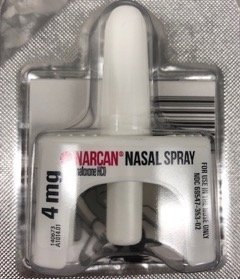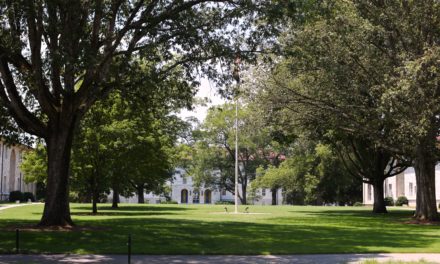Georgia is currently awaiting Gov. Brian Kemp’s decision to sign or veto Senate Bill 395, which would allow schools to possess and administer naloxone and allow any visitor, student or employee to possess the medication on school grounds. Progress on the bill has been stalled for nearly two weeks after the Georgia General Assembly sent the bill to Kemp on April 4.
Naloxone, commonly referred to by its brand name Narcan, is a medication that can quickly restore breathing and temporarily reverse an opioid overdose.

Narcan is used to reverse the effects of an opioid overdose. (Courtesy of Wikimedia Commons/Evilleavenger)
The Georgia Senate unanimously passed the new bill on March 28, which combines actions from three other measures to make naloxone available in government buildings, college campuses and schools. If signed into law, the bill states that schools would be authorized to have naloxone in stock and trained school personnel would be allowed to administer the medication without liability.
Current Georgia law limits on-campus options to preemptively obtain naloxone and restricts Emory University employees from freely distributing the medication. Assistant Professor of Nursing Sarah Febres-Cordero wrote in an email to The Emory Wheel that Georgia’s current medical amnesty law states that only pharmacists are allowed to distribute naloxone.
Assistant Director of State Affairs Sydney Wilkins represented the Emory Addiction Center in February hearings discussing House Bill 1035, which is one of the bills combined into Senate Bill 395, according to Febres-Cordero. Wilkins stated that the University has plans to expand access to naloxone vending machines across all of Emory’s campuses, but is currently not permitted to do so.
Title 26, Chapter 4, Article 5 of the Official Georgia Code Annotated states that any individual selling or distributing drugs through a vending machine will be charged as guilty with a misdemeanor.
Despite prohibitions on schools distributing naloxone, Emory community members are working to promote overdose education. Febres-Cordero started the overdose education and naloxone distribution (OEND) lab at the Nell Hodgson Woodruff School of Nursing, which aims to educate people on safe drug use and naloxone distribution.
Febres-Cordero stated that the OEND lab lobbied for Senate Bill 395, as well as other measures that would allow schools to give out naloxone, in conjunction with Georgia Overdose Prevention and the Georgia Harm Reduction Coalition.
According to the Georgia Department of Public Health, the state of Georgia had 2,390 drug overdose deaths in 2021, 71% of which were caused by opioids. Furthermore, 57% of overdose deaths were attributed to fentanyl, a 124% increase from 2019 to 2021.
Oxford College Associate Professor of Psychology Jennifer McGee (10G, 14G) noted that fentanyl, a synthetic opioid, is a very “powerful drug” that can cause overdoses, even when only taken in small amounts.
“The biggest concern is that fentanyl is essentially odorless, tasteless and you need so little of it to have an effect, especially for an unexperienced user, that it’s making its way into other drugs,” McGee said.
In an email to the Wheel, Assistant Vice President of University Communications Laura Diamond wrote that members of the Emory community can currently access naloxone in the event of an emergency through Emory first responders or from the Emory Addiction Center. She added that the Emory Police Department and Emory Emergency Medical Services are trained to administer the medication.
The University will continue to inform the community if there are plans to increase the availability of naloxone on its campuses, Diamond wrote.
Currently, anyone can purchase naloxone at pharmacies and retail stores after the Georgia Department of Public Health issued a standing order in 2017 that acted as a “statewide prescription,” former Georgia Gov. Nathan Deal wrote in a press release. Additionally, retail stores such as CVS currently sell Narcan for $44.99 per box, which contains two single-dose nasal spray devices.
Family Nurse Practitioner Josh Lehrer (22N, 23N) expressed his frustration with the current naloxone accessibility on Emory’s campuses in a statement to the Wheel.
“It is contradictory to be an institution with such impressive expertise and resources that simultaneously limits availability and utilization of naloxone on its campus premises,” Lehrer wrote.
McGee expressed the benefits and importance of greater access to naloxone, primarily because some people in need of the medication may be unable or unwilling to contact emergency services.
“There’s a lot of people who would not call 911 if they suspected an overdose, especially if they’re also using drugs or if they’re drunk or something like that and they don’t want to get in trouble,” McGee said. “You can push this whole good samaritan thing all you want, but at the end of the day, people are nervous about their own safety and their own interactions with the police.”
Associate Professor of Law Matthew Lawrence discussed how stigma surrounding mental health and drug addiction may limit the related public health policies of Georgia.
“Some laws reflect this belief that addiction is a choice and the way to fix it is to punish the person suffering from addiction,” Lawrence said. “It’s a perspective that if we took it to diabetes, we would think was kind of silly, but it persists with regard to addiction, and so some laws reflect that kind of misunderstanding.”
Lawrence believes the limited legal support for those at risk of opioid overdoses go deeper than the barriers to naloxone and that expanding accessibility through methods like vending machines only fixes a small piece of the larger problem.
However, McGee highlighted that, in the short term, naloxone can save lives.
“It’s shocking,” McGee said. “If you talk to EMS folks who have used it or anybody who has used it, it’s like they come back to life. They’re cold and blue, and they sit up and are talking.”





